Ford Issues New ‘Do Not Drive’ Advisory for 765,000 Vehicles
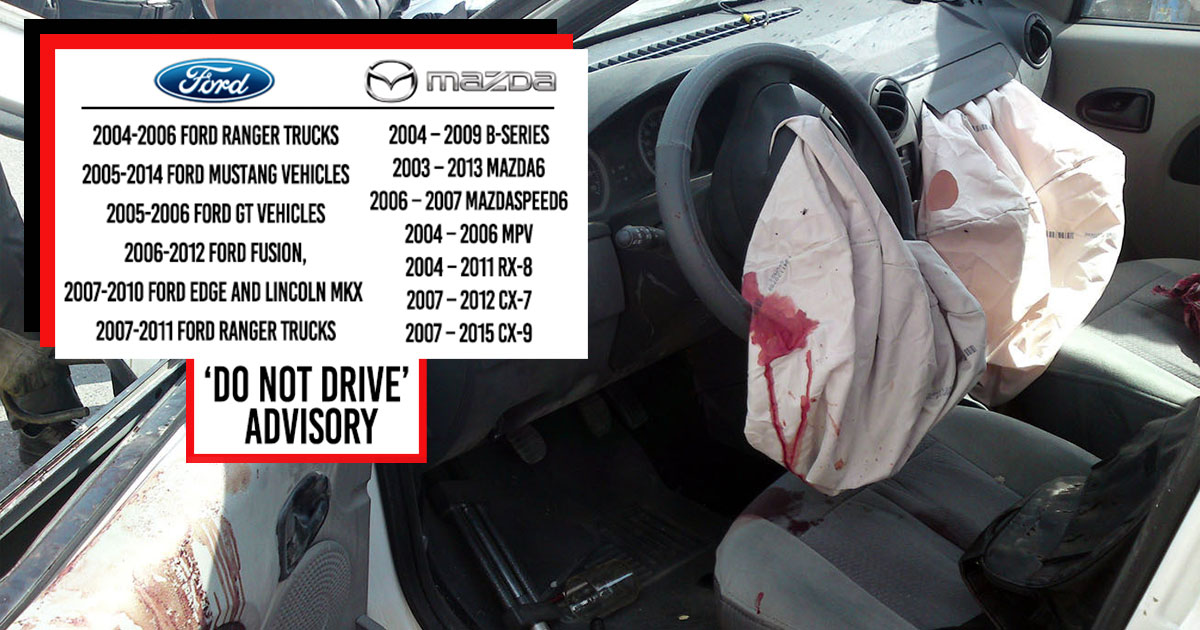
Ford’s Urgent ‘Do Not Drive’ Advisory: What You Need to Know
Ford has just issued a significant safety warning, urging owners of more than 765,000 cars and trucks to stop driving them immediately. This new advisory includes some of the automaker’s most iconic models, such as the Mustang and the Ranger. This recall affects vehicles made between 2004 and 2014, and it’s not a situation to take lightly. If you’re driving one of these vehicles, you need to park it immediately and arrange for repairs.
Why This New Recall Matters
This isn’t just another recall; it’s a matter of life and death. Ford’s warning stems from issues with Takata airbags installed in these vehicles.
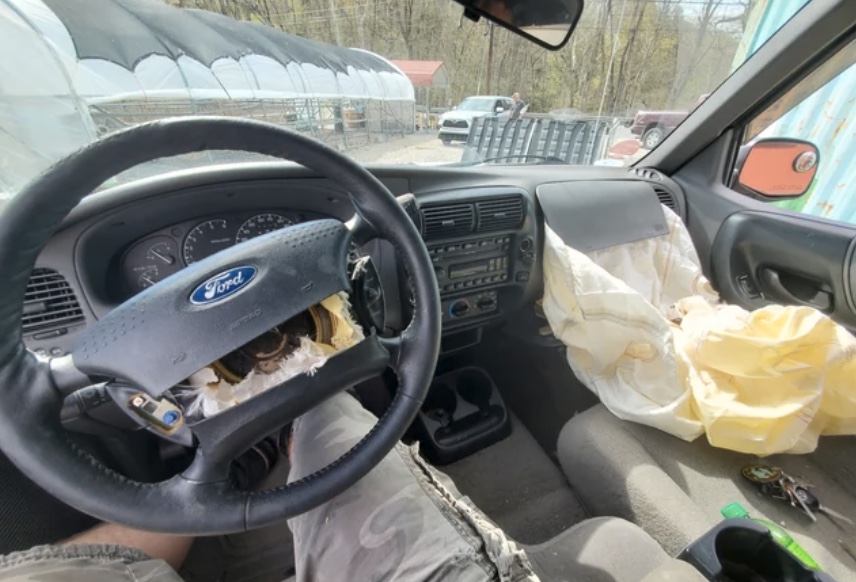
These airbags have been known to explode with dangerous force, sending sharp metal fragments flying into the cabin during a crash. This can cause severe injury or even death to the driver or passengers. Ford’s new advisory is clear: if you’re driving one of these affected vehicles, stop now and get it fixed.
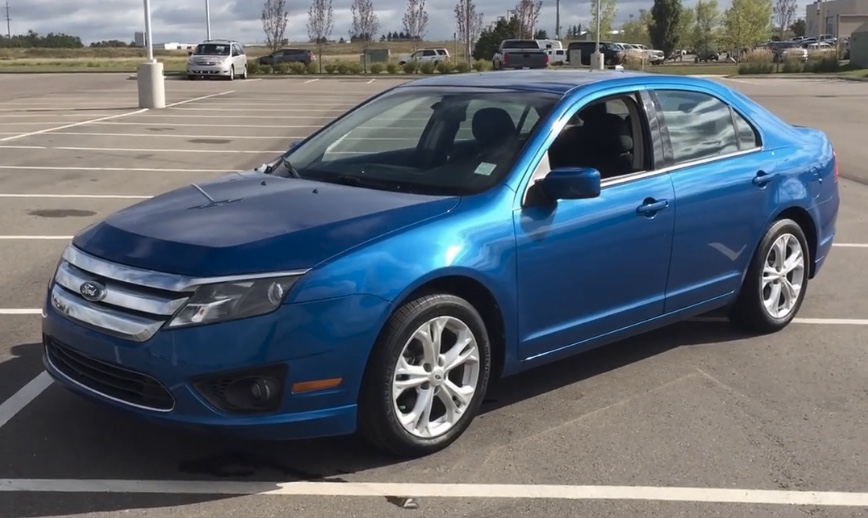
Which Vehicles Are Affected?
Ford’s new ‘do not drive’ advisory covers a wide range of vehicles, including popular models that many people still use daily. Here’s a rundown of the affected models:
- 2004-2006 Ford Ranger trucks
- 2005-2014 Ford Mustang vehicles
- 2005-2006 Ford GT vehicles
- 2006-2012 Ford Fusion, Mercury Milan, Lincoln MKZ / Zephyr vehicles
- 2007-2010 Ford Edge and Lincoln MKX vehicles
- 2007-2011 Ford Ranger trucks
If you own any of these vehicles, it’s crucial to stop driving them immediately and contact Ford to arrange for repairs.
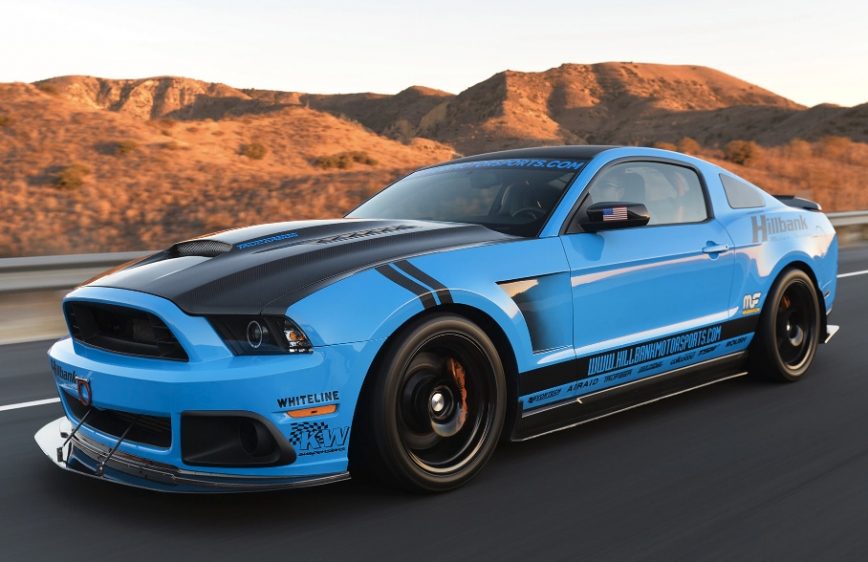
The Danger of Takata Airbags
The Takata airbag issue isn’t new. Over the past decade, millions of vehicles have been recalled due to these faulty airbags. The problem lies in the airbag’s inflator, which can degrade over time, especially in hot and humid conditions. When these airbags deploy, they can explode with excessive force, sending metal shrapnel into the cabin.
Ford’s new advisory emphasizes the increased risk due to the age of these vehicles. Some of them are now more than 20 years old, which significantly raises the likelihood of an airbag malfunction. Ford and the National Highway Traffic Safety Administration (NHTSA) are taking this risk very seriously, and so should you.
What Should Ford Owners Do Now?
If your vehicle is on the list, don’t wait. Here’s what you need to do:
- Park Your Vehicle: Stop driving the vehicle immediately. The risk is too high to continue driving until the airbag is fixed.
- Contact Ford: Reach out to Ford directly or visit their website to arrange for repairs. Ford is offering mobile service to come to your home, or they will tow your vehicle to a dealer for free.
- Get a Loaner Vehicle: If needed, Ford will provide a loaner vehicle at no cost while your car is being repaired.
- Check Your VIN: If you’re unsure whether your vehicle is affected, use your Vehicle Identification Number (VIN) to check on Ford’s recall website.
Ford’s Ongoing Efforts to Address the Recall
Ford isn’t taking this lightly. They’ve been working tirelessly to contact affected owners and get these vehicles off the road until they’re safe to drive again. So far, Ford has made over 121 million outreach attempts, including letters, emails, phone calls, text messages, and even home visits. Despite these efforts, some vehicles remain on the road, which is why this new advisory is so urgent.
The company reports that 95% of U.S. customers have already completed the necessary repairs for the Takata airbag recalls. However, with over 765,000 vehicles still affected, Ford is doubling down on its efforts to get the word out and ensure that every last vehicle is repaired.
Mazda’s Involvement in the Recall
It’s not just Ford vehicles that are affected. Mazda has also issued a ‘do not drive’ advisory for certain models that were equipped with the same faulty Takata airbags.
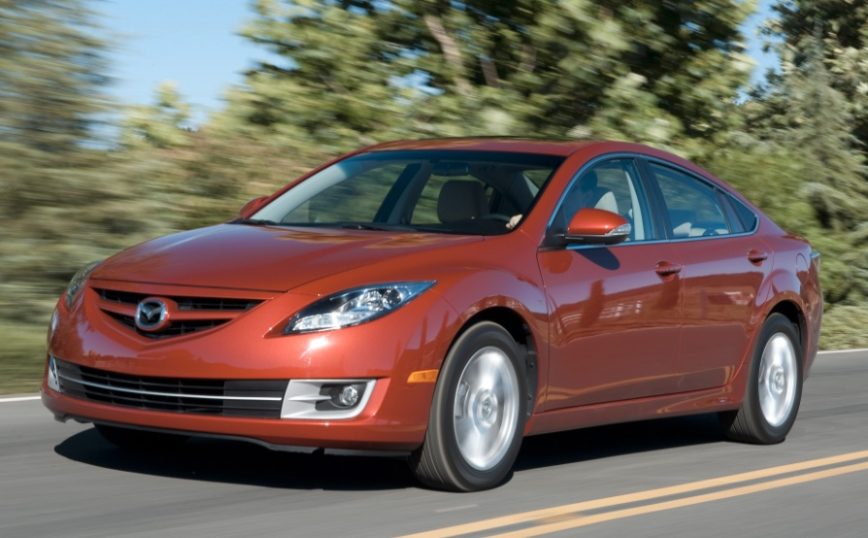
This recall affects over 82,000 Mazda vehicles, including:
- 2004 – 2009 B-Series
- 2003 – 2013 Mazda6
- 2006 – 2007 MazdaSpeed6
- 2004 – 2006 MPV
- 2004 – 2011 RX-8
- 2007 – 2012 CX-7
- 2007 – 2015 CX-9

If you own one of these Mazda models, the advice is the same: stop driving the vehicle and get it repaired immediately.
Why the New Urgency?
You might be wondering why this issue is surfacing again, years after the initial recalls. The answer lies in the age of the vehicles and the severity of the potential danger. As these vehicles get older, the risk of an airbag explosion increases. Ford’s new advisory is a response to this heightened risk, especially as some of these vehicles approach or exceed 20 years on the road.
The fact that some vehicles haven’t been repaired yet is concerning. Ford’s new push is about ensuring that every last vehicle is made safe before another tragedy occurs. If you’ve been putting off the repair, now is the time to take action.
The Impact of the Takata Airbag Recall
The Takata airbag recall is one of the largest and most complex safety recalls in automotive history. It has affected millions of vehicles across nearly every major automaker, leading to widespread concern and significant legal and financial consequences for Takata and the manufacturers involved.
For Ford, this new advisory is a critical step in resolving the remaining issues with the recalled vehicles. The company has faced scrutiny over the speed and effectiveness of its recall efforts, and this latest move shows a renewed commitment to getting these dangerous vehicles off the road.
What Happens Next?
For affected Ford and Mazda owners, the next steps are clear: stop driving the vehicle and arrange for immediate repairs. Ford will continue its outreach efforts, and NHTSA will monitor the situation closely to ensure that as many vehicles as possible are repaired quickly.
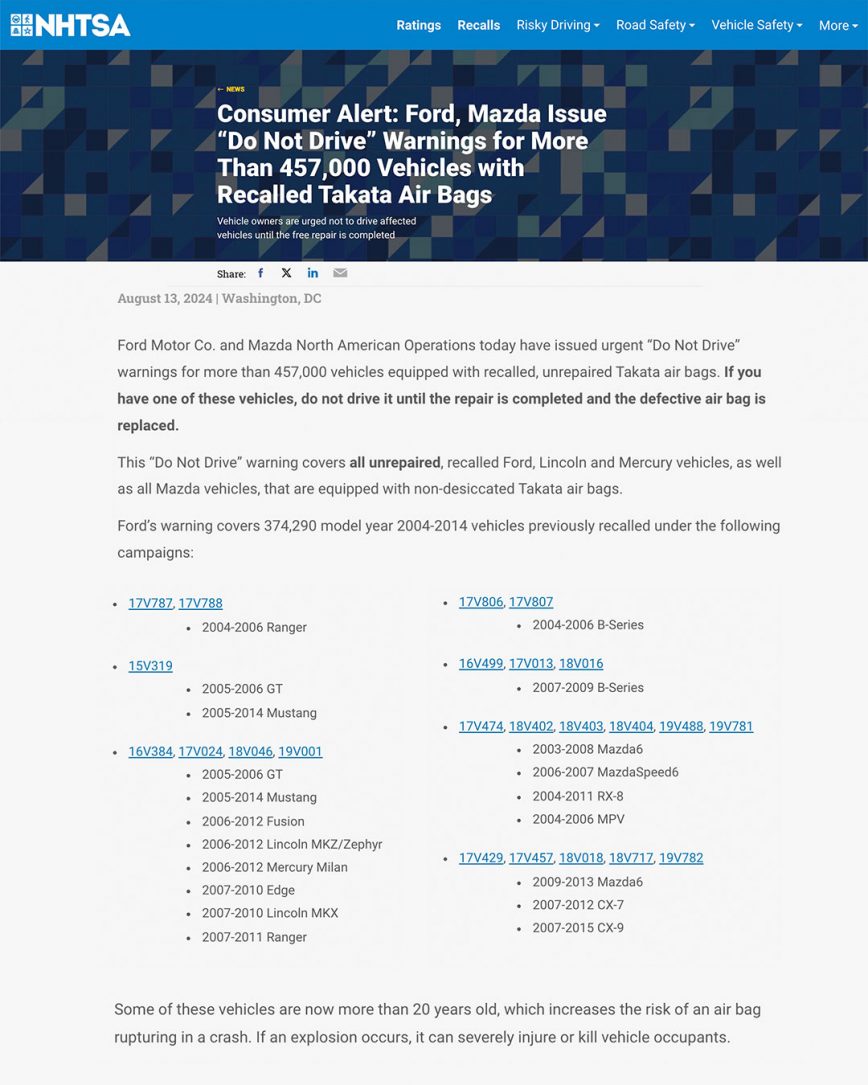
If you own a vehicle that’s part of this new recall, don’t take any chances. The risks are real, and the consequences of ignoring this advisory could be catastrophic. Take action now to protect yourself and your passengers.
Staying Safe on the Road
Vehicle safety recalls like this one are a reminder of the importance of staying informed and proactive about your vehicle’s maintenance. Always check for recalls on your vehicle and address them as soon as possible. Your safety and the safety of those around you depend on it.
Ford’s new ‘do not drive’ advisory is a stark reminder of the dangers that can lurk in even the most trusted vehicles. By taking immediate action, you can ensure that your car or truck is safe to drive and continue to enjoy the freedom of the open road without worry.

